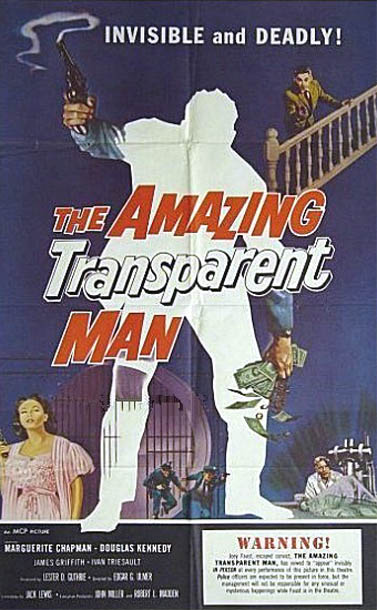Surrender, Dorothy (8/6/02)
____________
The Amazing Transparent Man. [Edgar Ulmer, 1960. Written by Jack Lewis.]
A curious attempt to graft the head of H.G. Wells onto the body of Christopher Marlowe: after a textbook prison break and a night pursuit by bloodhounds through the woods, hardboiled safecracker Douglas Kennedy, aka [a cough behind the hand] Joey Faust, is spirited away by mysterious blonde Marguerite Chapman in a gigantic tailfinned convertible [a charming reminder that in more ways than one this was an age of excess] and transported in despite of his unanswered questions to a lonely farmhouse in the middle of nowhere [as close as we can come to a gothic mansion here on the Texas plains], where he is introduced to the — Mephistophelean? — James Griffith, aka The Major, a smoothtalking mercenary in a cheap checked suit whose disturbingly bland smile is, clearly, emblematic of the banality of evil; and informed, to his astonishment, that he has been busted out for the sole purpose of purloining fissionable materials, the better to advance certain illdefined projects of probably diabolical intent. Greeting this harebrained proposal with a snort of derision and a few well-phrased objections, he discovers, to his even greater astonishment, that the Major and his assistants propose to ensure the success of the venture by rendering him invisible — and is ushered into the secret laboratory conveniently housed upon the premises, where he makes the acquaintance of thoroughly-bitchslapped refugee scientist Ivan Triesault, aka Dr. Ulof, and treated to an impressive proof of principle which involves twirling the many radio knobs on the racks of war-surplus electronics which line the walls and training an enormous raygun upon a guinea pig. — Sparks fly; thrilling forbidden-experiment flourishes crackle electrically through the strings; the lab animal vanishes. — And at this point, of course, the rest of it really does write itself: Faust signs on to the caper, is strapped to the table and rendered invisible, and pulls a couple of spectacular jobs which only accentuate his native predisposition toward hybris; Griffith lets drop a few alarming hints about his mad scheme for universal conquest [“With my invisible army I can — dare I say it? — rule the world!!”]; his success having provoked a reversal of fortune, the invisible man is confronted with the prospect of his imminent demise [the guinea pig expires! unforeseen side effects! what a surprise!] and discovers remorse just as the continuing irradiation somehow turns him into a gigantic lump of plutonium and [a suicide bomber whose cause is just] he blows up, taking the hidden fortress and the conspirators with him; excepting only the longsuffering German, who makes his escape to speak an epilogue ripe with the bitterly-won wisdom of the once-exploited scientist who will no longer loose Forbidden Knowledge upon the world.
Ulmer’s renowned genius for making a silk purse out of a B-movie sow’s ear is not much in evidence here: there are a couple of nice touches in the production design, and the exteriors are well-composed, but the interior cinematography is flatlit and uninspired and the grand metaphor never really gets off the ground — the safecracker is by virtue of his job description a kind of magician, the evil Major is certainly a devil incarnate, and the various pranks played by the invisible man on his hapless victims do recall the hijinks of the traditional Faust; but Ms. Chapman is not Helen of Troy nor even the unfortunate Gretchen, the Major does not seduce his accomplices with the prospect of worldly gain but browbeats them into acquiescence by threatening violence if they refuse to cooperate, and the less-mad-than-sad scientist is the real seeker after truth, leaving the putative protagonist an unexciting cipher. — “There is a man who has unlocked every door except the one to his own soul,” the German says, as he bids Faust farewell. Of course, he had no need to: the door was open, and the room, alas, was empty.
____________The nature of justice (5/31/02)

